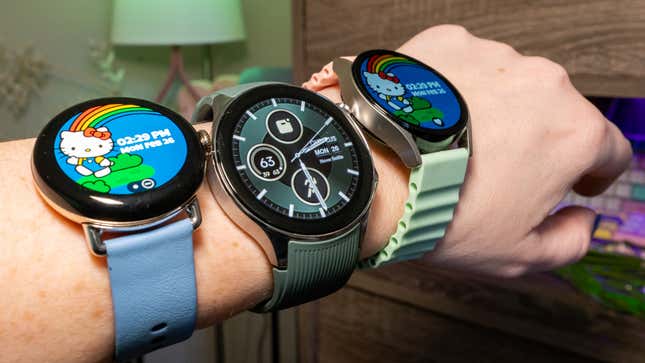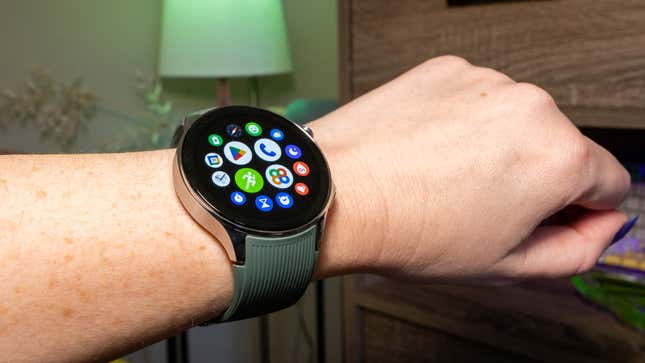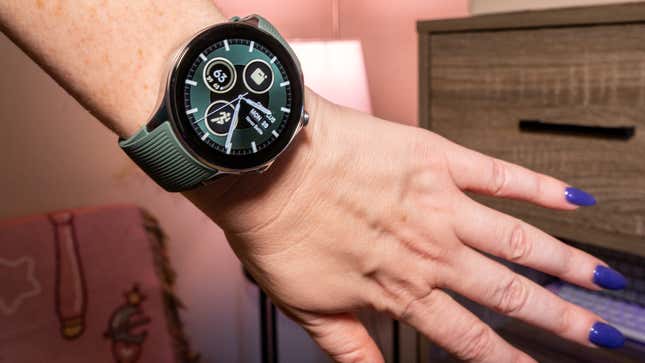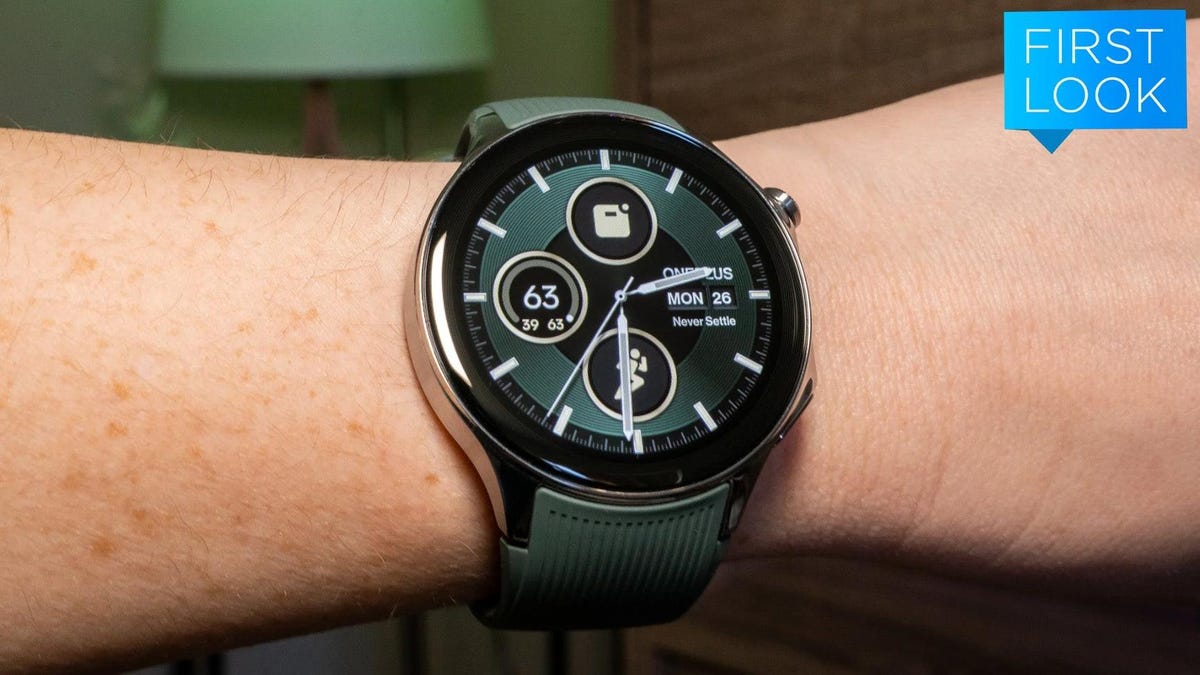I tried to wear the OnePlus Watch 2 for a short weekend workout but couldn’t. The watch is too big for me and too dense. It’s not just me, either; I asked my partner if his wrists would be interested in trying on the smartwatch, and he rejected it after seeing the relatively ginormous 47mm display. “That’s way too big for me. You know that’s why I hate wearing a watch.”
The Watch 2 is OnePlus’s second attempt at a smartwatch, and while it’s so much better than the first-generation release, there’s still plenty of room for improvement. For one, the OnePlus Watch 2 is too large and cumbersome for daily carry—especially if you want to wear it to take advantage of all the new health and fitness tracking capabilities. It’s also missing some features that should be standard from wellness-centric watches, including fall detection and an LTE connection on the go. At least this time, the OnePlus Watch runs actual Android software: this is the first OnePlus smartwatch to feature Wear OS.
How big is the OnePlus Watch 2?
How big exactly is the OnePlus Watch 2? Hopefully, the photo I’ve provided comparing it with two other major Android smartwatches gives you an idea. The watch is more significant than the Pixel Watch 2 and Galaxy Watch 6 in 42mm, which I typically wear.
In terms of dimensions, the OnePlus Watch is 47mm x 46.6mm x 12.1mm, which makes it a little bigger and a little thicker than the larger variant of Samsung’s Galaxy Watch 6 Classic. Surprisingly, the listed specifications say the OnePlus Watch 2 is a few grams lighter than the Galaxy Watch 6 Classic. Note that these weights do not include the watchbands.

A great second attempt
I have yet to test the OnePlus Watch 2 beyond wearing it and pawing at the software, which I’ll address shortly. I’m still looking for a way to sport it for a walk around the neighborhood. It’s so big on me that it doesn’t fit under my sleeves.
If you’re into the masculine, almost tactical aesthetic, this watch could have a place on your wrist. It comes in two colors: Black Steel and Radiant Steel, the latter of which OnePlus sent over. The sage greenish hue of the Radiant Steel watchband helps cut through some of the heaviness of the smartwatch’s exterior trimmings.
There are two side buttons on the OnePlus Watch 2, just like on other Android watches. If you’re wearing the watch on your left hand, the button on the right-hand bottom side is a regular push-button, while the top is supposed to be reminiscent of a dial. The rotating dial is legitimate; it’s just not enabled by the software for whatever reason. Thus, the top button is merely a fancy-looking push button to help the watch look more like a timepiece than a wrist display. I wish it worked like the dial on the Pixel Watch.
Admittedly, OnePlus isn’t a brand I think of when I’m making a resolution to track my health, but the OnePlus Watch 2 can do so through its OHealth app. The app can track over 100 types of movement, including “leisure” activities like tug of rope. It can also track sleep, stress levels, heart rate, and blood oxygen levels. The runners in my life have also mentioned the watch’s ability to track advanced running metrics, like ground contact time and VO2 max. I’m burnt out on deciding if Apple Health on the Apple Watch or Fitbit on the Pixel Watch is my favorite “wellness” aggregator, which makes it hard to get excited about starting over with a new health suite.
Inside, the OnePlus Watch 2 takes a hybrid approach to how it does processing. The company compares it to a hybrid sports car: one engine to take on the hefty loads and one to take care of everything else. In the case of the OnePlus Watch 2, it’s two disparate chipsets: the Qualcomm Snapdragon W5, which takes care of wellness and body tracking, and the BES 2700 MCU, a background processor that’s always on to handle things like calls, notifications, step count, and features within power saving mode. It’s not the first time an Android smartwatch has done this, but OnePlus could help set a precedent for others in the category who may be struggling to deliver on battery life and performance as promised. If only Fossil had enough runway to explore this route before shutting down its smartwatch division.
Welcome, Wear OS 4

The biggest caveat about the last OnePlus Watch is that it ran homebrewed software when other smartwatches in the ecosystem were transitioning to Google’s rebranded Wear OS. OnePlus’s take on the Wear OS 4 interface is fine—it’s the first to usher in Wear OS 4’s new ability to offload notifications to the co-processor. But its app drawer is reminiscent of a watchOS-wannabe, which is grating. The panning app drawer works with the Watch 2’s larger display, but I’d rather OnePlus does what Samsung does with its app drawer, which splays apps across the screen and allows me to scroll up and down rather than every which way.
What I’m trying to say is this: I’m on an Android device. Why does it look like I’m in the Apple ecosystem?
The best battery life
The last thing to note about the OnePlus Watch 2 is that it’s lauding up to 100 hours for its smartwatch as long as you use it in “smart mode.” This mode turns off the always-on display and limits GPS activity to half an hour. Even if you proceed with the AOD, the OnePlus promises at least 48 hours, which is already better than what Samsung and the Pixel Watch purport. And since OnePlus made SupeVOOC a thing, it’s on the smartwatch, too: the proprietary charger can charge the device fully in an hour.
I tested the charging speed of the OnePlus Watch 2—it’s faster than what I’d get waiting for the Pixel Watch 2 to reload before I head out on the town. I’ve yet to test the battery’s total capacity and will report in the full review.

I plan to follow up with a full assessment of the OnePlus Watch 2 as soon as I can figure out how to wear it comfortably. Namely, I’m curious about the data sharing between OHealth and the rest of the Android ecosystem. Google’s been reconfiguring how it syncs data through Health Connect, and I’m seeing its benefits within Fitbit and some of the third-party equipment I have on hand.

